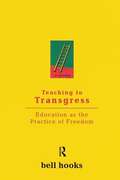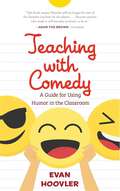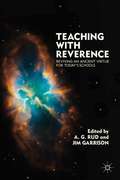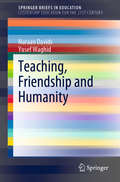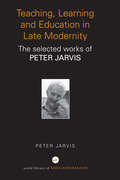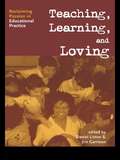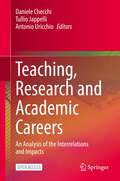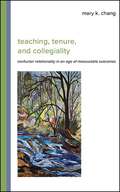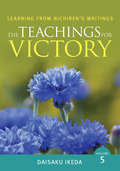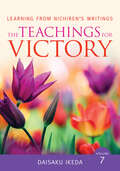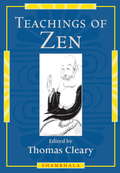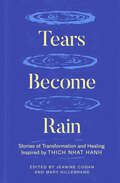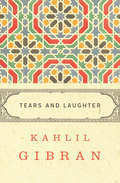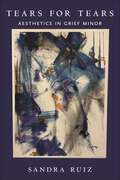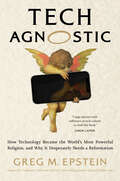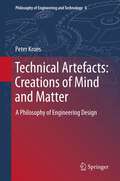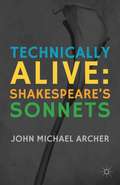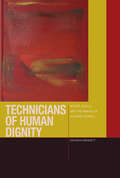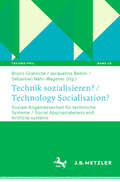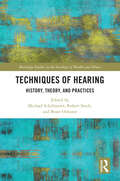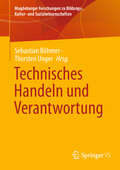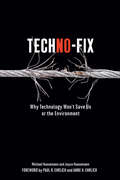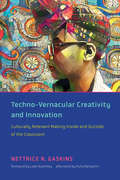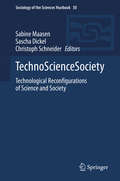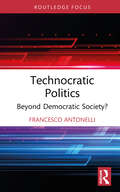- Table View
- List View
Teaching to Transgress: Education as the Practice of Freedom
by Bell HooksWidely admired as a leading black intellectual, hooks is also an inspired teacher. Here, she offers her ideas about teaching that fundamentally rethink democratic participation. These essays face squarely the problems of today's classrooms, including racism and sexism. Ms. hooks sees the gift of freedom--the freedom to think critically--as a teacher's most important goal.
Teaching with Comedy: A Guide For Using Humor in the Classroom
by Evan HoovlerEvan Hoovler uses his decades of comedy experience to engage students in the classroom—and now he&’s sharing all his secrets in Teaching With Comedy. Any teacher can become more effective and engaging by laughing along with these simple exercises. Instead of using &“look-at-me&” tactics to get students&’ attention, Hoovler wants to do the opposite—he uses humor to focus attention on the lesson (not the instructor) and guide a distracted class back on track. With anecdotes and explanations, Hoovler walks you through how to use certain jokes to keep students engaged and on task. You&’ll get prompts and ideas for exercises to use in your own classes, from an expert with decades of experience.Even those who aren&’t teachers will enjoy this seasoned educator&’s Dave Barry-esque takes on public schools, the history of teaching, educational philosophy, and what exactly makes a joke-telling teacher good versus unbearably corny. Teaching with Comedy is the perfect gift for any teacher or comedy fan seeking light-but-meaningful reading fare.
Teaching with Reverence
by Jim Garrison A. G. RudReverence is a forgotten virtue in teaching and learning. When taken in a broader spiritual sense, it is often associated with a mute and prim solemnity. The essays gathered here examine reverence as a way to understand some of the spiritual dimensions of classroom teaching.
Teaching, Friendship and Humanity (SpringerBriefs in Education)
by Nuraan Davids Yusef WaghidThis book extends liberal understandings in and about democratic citizenship education in relation to university pedagogy, more specifically higher teaching and learning. The authors’ argument is in defence of cultivating humanity through (higher) educational encounters on the basis of virtues that connect with the idea of love. Unlike romantic and erotic love, the book examines love in relation to educational encounters whereby humans or citizens can engage autonomously, deliberatively andresponsibly, yet lovingly. The rationale for focussing on the notion of philia (love) in educational encounters, the authors argue, is that doing so allows our current understandings of such encounters to be expanded beyond mere talk of reasonable engagements—autonomous action, deliberative iterations, and simple action—toward emotive enactments that could enhance human relations in educational encounters.
Teaching, Learning and Education in Late Modernity: The Selected Works of Peter Jarvis
by Peter JarvisProfessor Peter Jarvis has spent over 30 years researching, thinking and writing about some of the key and enduring issues in education. He has contributed well over 30 books and 200 papers and chapters in books on learning theory, adult education and learning, continuing professional education, nurse education, primary school education, distance education and third age education. In this book, he brings together 19 key writings in one place. Starting with a specially written Introduction, which gives an overview of Peter’s career and contextualises his selection within the development of the field, the chapters cover: Learning Learning and Spirituality Learning and Doing Teaching The End of Modernity Learning in Later Life. This book not only shows how Peter's thinking developed during his long and distinguished career; it also gives an insight into the development of the fields to which he contributed. In the World Library of Educationalists, international scholars themselves compile career-long collections of what they judge to be their finest pieces – extracts from books, key articles, salient research findings, major theoretical and/practical contributions – so the world can read them in a single manageable volume. Readers will be able to follow the themes and strands of their work and see their contribution to the development of a field, as well as the development of the field itself. Contributors to the series include: Richard Aldrich, Stephen J. Ball, John Elliott, Elliot Eisner, Howard Gardner, John Gilbert, Ivor F. Goodson, David Labaree, John White, E.C. Wragg .
Teaching, Learning, and Loving: Reclaiming Passion in Educational Practice
by Jim Garrison Daniel ListonFirst Published in 2004. Routledge is an imprint of Taylor & Francis, an informa company.
Teaching, Research and Academic Careers: An Analysis of the Interrelations and Impacts
by Daniele Checchi Tullio Jappelli Antonio UricchioThis open access book evaluates research quality, quality of teaching and the relationship between the two through sound statistical methods, and in a comparative perspective with other European countries. In so doing, it covers an increasingly important topic for universities that affects university funding. It discusses whether university evaluation should be limited to a single factor or consider multiple dimensions of research, since academic careers, teaching and awarding degrees are intertwined. The chapters included in the book evaluate teaching and research, also taking the gender dimension into account, in order to understand where and when gender discrimination occurs in assessment. Divided into five sections, the book analyses the administrative data on the determinants of career completion of university students; increasing precariousness of academic careers, especially of young researchers; methods designed to assess research productivity when co-authorship and team production are becoming the standard practice; and interrelations between students’ achievements and teachers’ careers driven by research assessment. It brings together contributions from a large group of economists, statisticians and social scientists working under a project sponsored by ANVUR, the Italian agency for the evaluation of teaching and research of academic institutions. From an international perspective, the findings in this book are particularly interesting because despite low tuition costs, tertiary education in Italy has relatively low enrolment rates and even lower completion rates compared to those in other European and American countries.This book is of interest to researchers of the sociology of education, education policy, public administration, economics and statistics of education, and to administrators and policy makers working in the area of higher education.
Teaching, Tenure, and Collegiality: Confucian Relationality in an Age of Measurable Outcomes (SUNY series in Asian Studies Development)
by Mary K. ChangTeaching, Tenure, and Collegiality espouses the concept of relationality—the idea that people’s activities necessarily emerge through contextual engagement with others—as an alternative to the "publish or perish" ethos in higher education. Building on research by comparative philosophers, Mary K. Chang constructs a concept of Confucian relationality and engages it to question universities’ increasing reliance on market-oriented metrics to determine their strategic directions and gauge faculty productivity. Using a process-oriented approach that features change, the embodied connectedness of people, and the extensive impact of personal cultivation, Chang situates higher educational institutions as continually constructed by people's actions in ways that cannot be wholly described or quantified—and need not be. Values are powerful in educational contexts because they direct how administrators, faculty, and students focus limited energy. Teaching, Tenure, and Collegiality reevaluates what universities normatively value and offers a holistically expansive view that positions faculty as experts and learners whose activity is inseparable from the contexts constructed by the relationships from which they emerge.
Teachings for Victory, vol. 5: The Teachings For Victory, Vol. 5 (Learning from Nichiren's Writings)
by Daisaku IkedaSGI President Daisaku Ikeda elucidates the importance of studying Nichiren's writings as the foundation of Nichiren Buddhism as practiced by the Soka Gakkai International. His lectures bring Nichiren's immense wisdom, compassion, and courage into focus for the present age. In reading and studying these lectures, we learn how to reply in daily life Nichirens profound philosophy for inner transformation and victory for both ourselves and others. This volume of Learning From Nichiren's Writings contains SGI President Ikeda's lectures on nine of Nichiren's Writings:"Persecution by Sword and Staff""Reply to the Lay Priest Takahashi""The Embankments of Faith""Three Tripitaka Masters Pray for Rain""The Bow and Arrow""The Pure and Far-Reaching Voice""The Treatment of Illness""Daimoku as the Seed of Buddhahood""Reply to the Mother of Ueno"
Teachings for Victory, vol. 7 (Learning from Nichiren's Writings)
by Daisaku IkedaNichiren Daishonin's writings provide a practical formula for enabling all people to achieve victory in every aspect of their lives and attain an unshakable state of happiness.This volume of Learning from Nichiren's Writings: The Teachings for Victory contains two commemorative lectures (November 18 and January 26) by SGI President Daisaku Ikeda in addition to lectures on nine of Nichiren's letters:“Early Desires Are Enlightenment”“The Daimoku of the Lotus Sutra”“Letter to Horen”“Encouragement to a Sick Person”“The Two Kinds of Faith”“The Gift of Rice”“On Rebuking Slander of the Law and Eradicating Sins”“The Great Battle”“On Establishing the Correct Teaching for the Peace of the Land”President Ikeda elucidates the importance of studying Nichiren's writings as the foundation of Nichiren Buddhism as practiced by the Soka Gakkai International. His lectures bring Nichiren's immense wisdom, compassion, and courage into focus for the present age. In reading and studying these lectures, we learn how to apply in daily life Nichiren's profound philosophy for inner transformation and victory for both ourselves and others.The Teachings for Victory will empower you to develop the strength and wisdom to bring forth your inherent potential.
Teachings of Zen
by Thomas ClearyZen Buddhism emerged in China some fifteen centuries ago and remained the most dynamic and influential spiritual movement in Asia for more than a millennium. Though the teachings of the first Zen masters are sometimes considered innovation, they were actually a return to the core of Buddhist teaching and to an understanding of the importance of the personal experience of enlightenment. This anthology presents talks, sayings, and records of heart-to-heart encounters to show the essence of Zen teaching through the words of the Zen masters themselves. The selections have been made from the voluminous Zen canon for their accessibility, their clarity, and above all their practical effectiveness in fostering insight.
Tears Become Rain: Stories of Transformation and Healing Inspired by Thich Nhat Hanh
by John Bell Kaira Jewel Lingo Celia Landman32 mindfulness practitioners around the world reflect on encountering the extraordinary teachings of Zen master Thich Nhat Hanh, who passed away in January 2022, exploring themes of coming home to ourselves, healing from grief and loss, facing fear, and building community and belonging.Some moments change our lives. We experience wonder and relief when we realize we can be okay, just as we are. How do we then integrate these transformative moments into our daily life? Tears Become Rain is a collection of such stories, with one common inspiration: the teachings of mindfulness and compassion offered by the most influential meditation teacher of the past century, the Buddhist monk and peace activist Thich Nhat Hanh, who was nominated for the Nobel Peace Prize by Dr. Martin Luther King.The stories encapsulate the benefits of mindfulness practice through the experiences of ordinary people from 16 countries around the world. Some of the contributors were direct students of Thich Nhat Hanh for decades and are meditation teachers in their own right, while others are relatively new on the path.After her mother's death, Canadian author Vickie MacArthur writes poignantly of discovering a source of peace within herself at Thich Nhat Hanh's Plum Village monastery in France. Jamaican American English professor Camille Goodison uncovers the racism of academia and finds freedom from her toxic workplace by practicing the teachings of love and liberation as taught to her by Thich Nhat Hanh. Vietnamese doctor Huy Minh Tran shares how mindfulness helped him transform his traumatic past as a refugee so that he no longer suffers from nightmares. Norwegian Eevi Beck meditates on the teacher-student relationship and how Thich Nhat Hanh supported her marriage and then loss of her husband. For many, battling sickness, old age, and death—the death of loved ones and one's own—brings up overwhelming emotions of grief, anger, and despair but with the wisdom of Zen practice, Tears Become Rain shows again and again how people are able to find refuge from the storm in their lives and open their hearts to joy. Through sharing their stories, Tears Become Rain is both a celebration of Thich Nhat Hanh and a testament to his lasting impact on the lives of people from many walks of life.
Tears and Laughter
by Kahlil GibranThis classic work showcases the early brilliance and philosophical foundation of Kahlil Gibran, one of the most influential writers of the twentieth century Kahlil Gibran, author of The Prophet and one of the twentieth century&’s most revolutionary, inspiring writers, effortlessly blends his unique perspective on Eastern and Western philosophy in this early collection of work, written when he was just twenty years old. From delicate turns of phrase to strong assertions of equality, delightful rejoicings to frightening prophecies, Gibran&’s poetry and prose reveal his eternal hunger for love and beauty. This expanded edition includes key works of social justice such as &“The Bride&’s Bed&” and firmly establishes Gibran&’s role as champion of human rights and individual liberty.
Tears for Tears: Aesthetics in Grief Minor (Minoritarian Aesthetics)
by Sandra RuizHow minoritarian artists grapple with both personal and collective griefTears for Tears documents moments of tension, negotiation, transformation, and incommensurability between singular loss and mass death through the work of contemporary minoritarian artists. These artists interrogate the cultural, social, and political enmeshment of death by questioning the interior and exterior conditions of loss Charting communal, singular, ongoing, and impending loss due to state-sanctioned violence, colonial racial capitalism, natural disaster, and social and personal circumstances, Sandra Ruiz underscores the affective entanglements across death that reshape the topography of grief into portals of possibility.Drawing from original interviews, familial artifacts, images, and personal archival notes of artists—much of which have never been written about before—the project centers the minoritarian artist as living with and against death in everyday life and art practice. In doing so, the manuscript stages an archival and ideological intervention into the life of grief for minoritarian subjects and artists.Moving across performance and video art, sculpture, dance, music, theatre, and poetry, Ruiz highlights the relationship between everyday life and staged events as a critical lens to rethink structures of colonial and imperial spatial temporalities of grief. Offering invaluable insights into the production of these works and performances, Ruiz reveals how these artists move across social, corporeal, and psychic constructions of sorrow in their art practices—often working from parental loss into the domain of communal death—and see grieving, however painful, as an act of empowerment, transformation, growth, and communal building.
Tech Agnostic: How Technology Became the World's Most Powerful Religion, and Why It Desperately Needs a Reformation
by Greg EpsteinAn urgently needed exploration of global technology worship, and a measured case for skepticism and agnosticism as a way of life, from the New York Times–bestselling author of Good without God.Today&’s technology has overtaken religion as the chief influence on twenty-first century life and community. In Tech Agnostic, Harvard and MIT&’s influential humanist chaplain Greg Epstein explores what it means to be a critical thinker with respect to this new faith. Encouraging readers to reassert their common humanity beyond the seductive sheen of &“tech,&” this book argues for tech agnosticism—not worship—as a way of life. Without suggesting we return to a mythical pre-tech past, Epstein shows why we must maintain a freethinking critical perspective toward innovation until it proves itself worthy of our faith or not.Epstein asks probing questions that center humanity at the heart of engineering: Who profits from an uncritical faith in technology? How can we remedy technology&’s problems while retaining its benefits? Showing how unbelief has always served humanity, Epstein revisits the historical apostates, skeptics, mystics, Cassandras, heretics, and whistleblowers who embody the tech reformation we desperately need. He argues that we must learn how to collectively demand that technology serve our pursuit of human lives that are deeply worth living.In our tumultuous era of religious extremism and rampant capitalism, Tech Agnostic offers a new path forward, where we maintain enough critical distance to remember that all that glitters is not gold—nor is it God.
Technical Artefacts: Creations of Mind and Matter
by Peter KroesThis book presents an attempt to understand the nature of technical artefacts and the way they come into being. Its primary focus is the kind of technical artefacts designed and produced by modern engineering. In spite of their pervasive influence on human thinking and doing, and therefore on the modern human condition, a philosophical analysis of technical artefacts and engineering design is lacking. Among the questions addressed are: How do technical artefacts fit into the furniture of the universe? In what sense are they different from objects from the natural world, or from the social world? What kind of activity is engineering design and what does it mean to say that technical artefacts are the embodiment of a design? Does it make sense to consider technical artefacts to be morally good or bad by themselves because of the way they influence human life? The book advances the thesis that technical artefacts, conceived of as physical constructions with a technical function, have a dual nature; they are hybrid objects combining physical and intentional features. It proposes a theory of technical functions and technical artefact kinds that does justice to this dual nature, analyses engineering design from the dual nature point of view, and argues that technical artefacts, because of their dual nature, have inherent moral significance.
Technically Alive
by John Michael ArcherDrawing on the later writings of Martin Heidegger, the book traces the correspondence between the philosopher's concept of technology and Shakespeare's poetics of human and natural productivity in the Sonnets.
Technicians of Human Dignity: Bodies, Souls, and the Making of Intrinsic Worth (Just Ideas)
by Gaymon BennettTechnicians of Human Dignity traces the extraordinary rise of human dignity as a defining concern of religious, political, and bioethical institutions over the last half century and offers original insight into how human dignity has become threatened by its own success. The global expansion of dignitarian politics has left dignity without a stable set of meanings or referents, unsettling contemporary economies of life and power.Engaging anthropology, theology, and bioethics, Bennett grapples with contemporary efforts to mobilize human dignity as a counter-response to the biopolitics of the human body, and the breakdowns this has generated. To do this, he investigates how actors in pivotal institutions —the Vatican, the United Nations, U.S. Federal Bioethics—reconceived human dignity as the bearer of intrinsic worth, only to become frustrated by the Sisyphean struggle of turning its conceptions into practice.
Technik sozialisieren? / Technology Socialisation?: Soziale Angemessenheit für technische Systeme / Social Appropriateness and Artificial Systems (Techno:Phil – Aktuelle Herausforderungen der Technikphilosophie #10)
by Bruno Gransche Jacqueline Bellon Sebastian Nähr-WagenerAnwendungen Künstlicher Intelligenz, Maschinellen Lernens sowie Robotik und weitere informatische Systeme spielen in immer mehr Bereichen der menschlichen Lebenswelt eine immer wichtigere Rolle. Technik wird dabei auch weiterhin und zunehmend Medium menschlicher Kommunikation und Interaktion sein, darüber hinaus wird jedoch auch immer mehr menschliche Interaktion nicht nur durch sondern mit Technik stattfinden. Eine Dimension neuer Mensch-Technik-Relationen ist dabei das Phänomen sozialer Angemessenheit. Obgleich sich dieses nicht auf ein einfaches Regelwerk reduzieren lässt, verhalten sich Menschen in zwischenmenschlicher Interaktion ganz selbstverständlich sozial angemessen und treffen in der Regel ohne Weiteres ‚den richtigen Ton‘. Wie aber verhält es sich mit ‚intelligenten‘ technischen Systemen? Können – sollten – diese mit Fähigkeiten zu entsprechendem Sozialverhalten ausgestattet werden, um damit auch eine weitere bedeutsame Grenze zwischen Mensch und Technik zum Verschwinden zu bringen? Anders gefragt: Ist es möglich und erforderlich, Technik zu sozialisieren?
Techniques of Hearing: History, Theory and Practices
by Michael Schillmeier, Robert Stock, and Beate OchsnerHearing, health and technologies are entangled in multi-faceted ways. The edited volume addresses this complex relationship by arguing that modern hearing was and is increasingly linked to and mediated by technological innovations. By providing a set of original interdisciplinary investigations that sheds new light on the history, theory and practices of hearing techniques, it is able to explore the heterogeneous entanglements of sound, hearing practices, technologies and health issues. As the first book to bring together historians, scholars from media studies, social sciences, cultural studies, acoustics and neuroscientists, the volume discusses modern technologies and their decisive impact on how ‘normal’ hearing, enhanced and smart hearing as well as hearing impairment have been configured. It brings both new insights into the histories of hearing technologies as well as allowing us to better understand how enabling hearing technologies have currently been unfolding an increasingly hybrid ecology engaging smart hearing devices and offering stress-free hearing and acoustic wellbeing in novel auditory environments. The volume will be of interest to all scholars and students of disability studies, sound studies, sociology of health and illness, medical history, health and society as well as those interested in the practices and techniques of self-monitored and smart hearing.
Technisches Handeln und Verantwortung (Magdeburger Forschungen zu Bildungs-, Kultur- und Sozialwissenschaften)
by Thorsten Unger Sebastian BöhmerWir sind daran gewöhnt, dass technische Bauten, Apparate und Anlagen funktionieren. Erst wenn Probleme auftreten, erfahren sie Aufmerksamkeit – und es wird die Frage nach der Verantwortung gestellt, oft an die beteiligten Ingenieure. Besonders intensiv wird diese Frage bei heiklen Hochtechnologien wie Atom- und Gentechnik oder sensiblen Infrastrukturen wie Brücken-, Kanal- und Tunnelbauten diskutiert. Im Katastrophenfall vermischen sich dann häufig juristische, sozio- und psychologische, wirtschaftliche, ethische, religiöse und ingenieurwissenschaftliche Aspekte, was sich auch für die Darstellung dieser Problematik in der Kultur seit dem Ausgang des 19. Jahrhunderts beobachten lässt. Der Band versammelt Beiträge von Expertinnen und Experten aus den Fachgebieten Maschinenbau, Technikphilosophie, Technikgeschichte, Moraltheologie, Berufs- und Betriebspädagogik, Literaturwissenschaft und Linguistik. Sie stellen theoretische wie praktische Aspekte von Verantwortung in der Ingenieurstätigkeit sowie entsprechende Diskurse in Politik, Kultur und Gesellschaft vor. Die Beiträge gehen zurück auf eine Ringvorlesung für Studierende aller Fakultäten im Sommersemester 2023 an der Otto-von-Guericke-Universität Magdeburg.
Techno-Fix: Why Technology Won't Save Us or the Environment
by Michael Huesemann Joyce HuesemannNanotechnology! Genetic engineering! Miracle Drugs! We are promised that new technological developments will magically save us from the dire consequences of the 300-year fossil-fueled binge known as modern industrial civilization, without demanding any fundamental changes in our behavior. There is a pervasive belief that technological innovation will enable us to continue our current lifestyle indefinitely and will prevent social, economic and environmental collapse. Techno-Fix shows that negative unintended consequences of technology are inherently predictable and unavoidable, techno-optimism is completely unjustified, and modern technology, in the presence of continued economic growth, does not promote sustainability, but hastens collapse. The authors demonstrate that most technological solutions to social and technology-created problems are ineffective. They explore the reasons for the uncritical acceptance of new technologies, show who really controls the direction of technological change, and then advocate extensive reform.This comprehensive exposé is a powerful argument for why we can and should put the genie back in the bottle. An insightful and powerful critique, it is required reading for anyone who is concerned about blind techno-optimism and believes that the time has come to make science and technology more socially and environmentally responsible.For more information, please visit technofix.org .
Techno-Vernacular Creativity and Innovation: Culturally Relevant Making Inside and Outside of the Classroom
by Nettrice R. GaskinsA novel approach to STEAM learning that engages students from historically marginalized communities in culturally relevant and inclusive maker education.The growing maker movement in education has become an integral part of both STEM and STEAM learning, tapping into the natural DIY inclinations of creative people as well as the educational power of inventing or making things. And yet African American, Latino/a American, and Indigenous people are underrepresented in maker culture and education. In this book, Nettrice Gaskins proposes a novel approach to STEAM learning that engages students from historically marginalized communities in culturally relevant and inclusive maker education. Techno-vernacular creativity (TVC) connects technical literacy, equity, and culture, encompassing creative innovations produced by ethnic groups that are often overlooked.TVC uses three main modes of activity: reappropriation, remixing, and improvisation. Gaskins looks at each of the three modes in turn, guiding readers from research into practice. Drawing on real-world examples, she shows how TVC creates dynamic learning environments where underrepresented ethnic students feel that they belong. Students who remix computationally, for instance, have larger toolkits of computational skills with which to connect cultural practices to STEAM subjects; reappropriation offers a way to navigate cultural repertoires; improvisation is firmly rooted in cultural and creative practices. Finally, Gaskins explores an equity-oriented approach that makes a distinction between conventional or dominant pedagogical approaches and culturally relevant or responsive making methods and practices. She describes TVC habits of mind and suggests methods of instructions and projects.
TechnoScienceSociety: Technological Reconfigurations of Science and Society (Sociology of the Sciences Yearbook #30)
by Christoph Schneider Sabine Maasen Sascha DickelThis book introduces the term of TechnoScienceSociety to focus on the ongoing technological reconfigurations of science and society. It aspires to use the breadth of Science and Technology Studies to perform a critical diagnosis of our contemporary culture. Instead of constructing technology as society’s “other”, the book sets out to highlight the both complex and ambivalent entanglements of technologies, sciences and socialities. It provides some tentative steps towards a diagnosis of a society in which individuals and organizations address themselves, their pasts, presents, futures, hopes and problems in technoscientific modes. Technosciences redesign matter, life, self and society. However, they do not operate independently: Technoscientific practices are deeply socially and culturally constituted. The diverse contributions highlight the ongoing technological reconfigurations of rationalities, infrastructures, modes of governance, and publics. The book aims to inspire scholars and students to think and analyze contemporary conditions in new ways drawing on, and expanding, the toolkits of Science and Technology Studies.
Technocratic Politics: Beyond Democratic Society? (Routledge Studies in Political Sociology)
by Francesco AntonelliThis book considers the role of experts and expertise in contemporary politics and the ways in which digitalisation and the use of technique are transforming practices of governance. Asking whether the Covid-19 crisis is likely to further advance or weaken these processes, it examines their impact on the future of democracy and urges rejection of the idea of technocracy as an alternative to politics. An examination of the relationship between social elites and technique, this volume highlights the threat posed to representative democracy of this fundamental mechanism of governance in the global world and reflects upon new forms of the political-economic regime. It is important reading for scholars of sociology and politics with interests in questions of power, governance, and representation.
